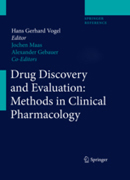
Drug Discovery and Evaluation has become a more and more difficult, expensiveand time-consuming process. The effect of a new compound has to be detected by in vitro and in vivo methods of pharmacology. The activity spectrum and the potency compared to existing drugs have to be determined.As these processes can be divided up stepwise we have designed a book series "Drug Discovery and Evaluation" in the form of a recommendation document. The methods to detect drug targets are described in the first volume of this series "Pharmacological Assays" comprising classical methods as well as new technologies. Before going to man, the most suitable compound has to be selected by pharmacokinetic studies and experiments in toxicology. These preclinical methods are described in the second volume „Safety and Pharmacokinetic Assays". Onlythen are first studies in human beings allowed. Special rules are establishedfor Phase I studies. Clinical pharmacokinetics are performed in parallel withhuman studies on tolerability and therapeutic effects. Special studies according to various populations and different therapeutic indications are necessary. These items are covered in the third volume: „Methods in Clinical Pharmacology". ÍNDICE: A. Clinical Pharmacokinetics.- Single Dose studies incl. Dose finding by allometry.- Multiple Dose studies.- Dose linearity and Proportionality.- Special Populations.- The hADME-study (incl. Dosimetry) and its results.- Synthesis of radiolabelled compounds for clinical studies.- Regulatory Guidelines regarding Metabolite identification and testing.- Drug-Drug interaction studies.- In vitro in vivo correlation for drug-drug interactions.- Specific studies for formulation development.- Absolute and relative bioavailability.- Bioequivalence.- PopKin approaches.- Bioanalysis of clinical studies.- Biomarker, surrogate parameters and clinical endpoints. -Toxicokinetics and safety ratios.- Relevance of transporters in clinical studies.- In vitro in vivo correlationfor transporters.- Specifities of oncology studies.- Pharmacogenomics and itsinfluence on Pharmacokinetics.- PK/PD approaches; B. Human Studies in Clinical Pharmacology: Methodologies of PD assessment - Scales.- Methodologies of PD assessment - BioStat. -Methodologies of Safety assessment.- Pharmacodynamic Evaluation.- Respiratory System.- Pharmacodynamic Evaluation.- Cardiovascular Methodologies.- Pharmacodynamic Evaluation.- CNS.- Pharmacodynamic Evaluation.- Diabetes Methodologies.- Pharmacodynamic Evaluation.- Metabolism/Lipids.- Pharmacodynamic Evaluation.- Inflammation/Immunology.- Pharmacodynamic Evaluation.- Pain.- Pharmacodynamic Evaluation.- Endocrinology.- Pharmacodynamic Evaluation.- Anesthetics.- Pharmacodynamic Evaluation.- Dermatology.- Pharmacodynamic Evaluation.- Oncology.- Pharmacodynamic Evaluation.- Antibiotics.- Pharmacodynamic DD interaction.- Pharmacogenomics: Pharmacodymanic relevance; C. Regulations: Regulatory requirements in Clinical Pharmacology
- ISBN: 978-3-540-89890-0
- Editorial: Springer
- Encuadernacion: Cartoné
- Páginas: 2000
- Fecha Publicación: 01/11/2010
- Nº Volúmenes: 2
- Idioma: Inglés
